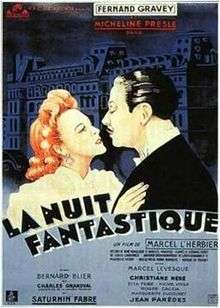La Nuit fantastique
| La Nuit fantastique | |
|---|---|
 | |
| Directed by | Marcel L'Herbier |
| Produced by | Union Technique Cinématographique; Henri Mallet, Guillaume Radot, Vincent Bréchignac |
| Written by |
Louis Chavance Maurice Henry |
| Starring |
Micheline Presle Fernand Gravey |
| Music by | Maurice Thiriet |
| Cinematography | Pierre Montazel |
Release dates | 10 July 1942 (France) |
Running time | 103 minutes |
| Country | France |
| Language | French |
La Nuit fantastique (The Fantastic Night[1]) is a 1942 French fantasy film directed by Marcel L'Herbier. It is regarded as one of the most successful films made in France during the German occupation.[2]
Plot
Denis, a poor student in philosophy, works as a night porter in the Paris market of Les Halles in order to pay for his studies. Constantly weary, he falls asleep and dreams of a beautiful girl in white, Irène, with whom he falls in love. An adventure follows in which he tries to save the girl from being married off for her money. When he awakes, he discovers Irène alive and real.
Cast
- Fernand Gravey, as Denis
- Micheline Presle, as Irène
- Saturnin Fabre, as Thalès
- Jean Parédès, as Cadet
- Michel Vitold, as Boris
- Bernard Blier, as Lucien
- Marcel Lévesque, as Doctor Le Tellier
- Charles Granval, as Adalbert, the blind man
Production
As L'Herbier was finishing Histoire de rire, his first film made during the Occupation, he was presented with a scenario written by Louis Chavance and Maurice Henry which immediately suggested to him the possibility of creating a film in the spirit of some of his earlier silent films, on a theme that he characterised as a "realistic fairy-tale". (At the time he seemed to be thinking of a tradition begun by the films of Georges Méliès, though in his later memoirs he made a link rather with a style derived from the Lumière brothers, in which realistic images were here pushed towards a kind of surrealism.)[3] It gave him the opportunity to return to the kinds of experiment with visual style, and now also with sound effects, which had marked silent films such as L'Inhumaine and Feu Mathias Pascal.
The dialogue was written by Henri Jeanson, uncredited because he was at the time forbidden to work for the press or the cinema following his imprisonment for pacifist writings and non-cooperation with the Vichy government.
Filming began in December 1941 at the Joinville studios in Paris. L'Herbier described the working conditions as being the worst he had known because of the extreme cold, sometimes as low as -15 °C, but at the same time he found it an exhilarating experience because he felt a creative freedom that he not known for many years.[4]
Reception
La Nuit fantastique was first shown in Paris in July 1942, in a version running for about 90 minutes because of nearly 15 minutes of cuts made by the distributor. L'Herbier blamed this for the film's lack of success with the public during 1942 and 1943. It was only in 1944 that a complete version was released.[5] This prompted André Bazin to write a substantial review article in which he asserted the film's significance in establishing a new spirit of independence to French film-making and in rehabilitating the spirit of Méliès and "the marvelous".[6] Another critic who saw the film on its release recalled it later with enthusiasm, saying that it had restored a sense of innovation to the Occupation cinema.[7]
References
- ↑ The film was shown in the United States in 1949, in a shortened version, as Fantastic Night (Boxoffice Barometer, 3 Dec. 1949, p.144), but it is now more generally known under its original title.
- ↑ The French Cinema Book; edited by Michael Temple and Michael Witt. (London: British Film Institute, 2004.) p 123. Georges Sadoul, Le Cinéma français (1890-1962). (Paris: Flammarion, 1962.) pp.92-93.
- ↑ Marcel L'Herbier, La Tête qui tourne. (Paris: Belfond, 1979.) pp.283-284.
- ↑ Marcel L'Herbier, La Tête qui tourne. (Paris: Belfond, 1979.) pp.285.
- ↑ Christophe Gauthier, "Le Tombeau de Méliès? La Nuit fantastique et le 'cinéma primitif'", in Marcel L'Herbier et l'art du cinéma; [ed. by Laurent Véray]. (Paris: Association française de recherche sur l'histoire du cinéma, 2007.) pp.257-258.
- ↑ André Bazin, French Cinema of the Occupation and Resistance; translated by Stanley Hochman. (New York: Frederick Ungar, 1981.) pp.75-79.
- ↑ Jacques Siclier, La France de Pétain et son cinéma. (Paris: Henri Veyrier, 1981.) pp.141-142.